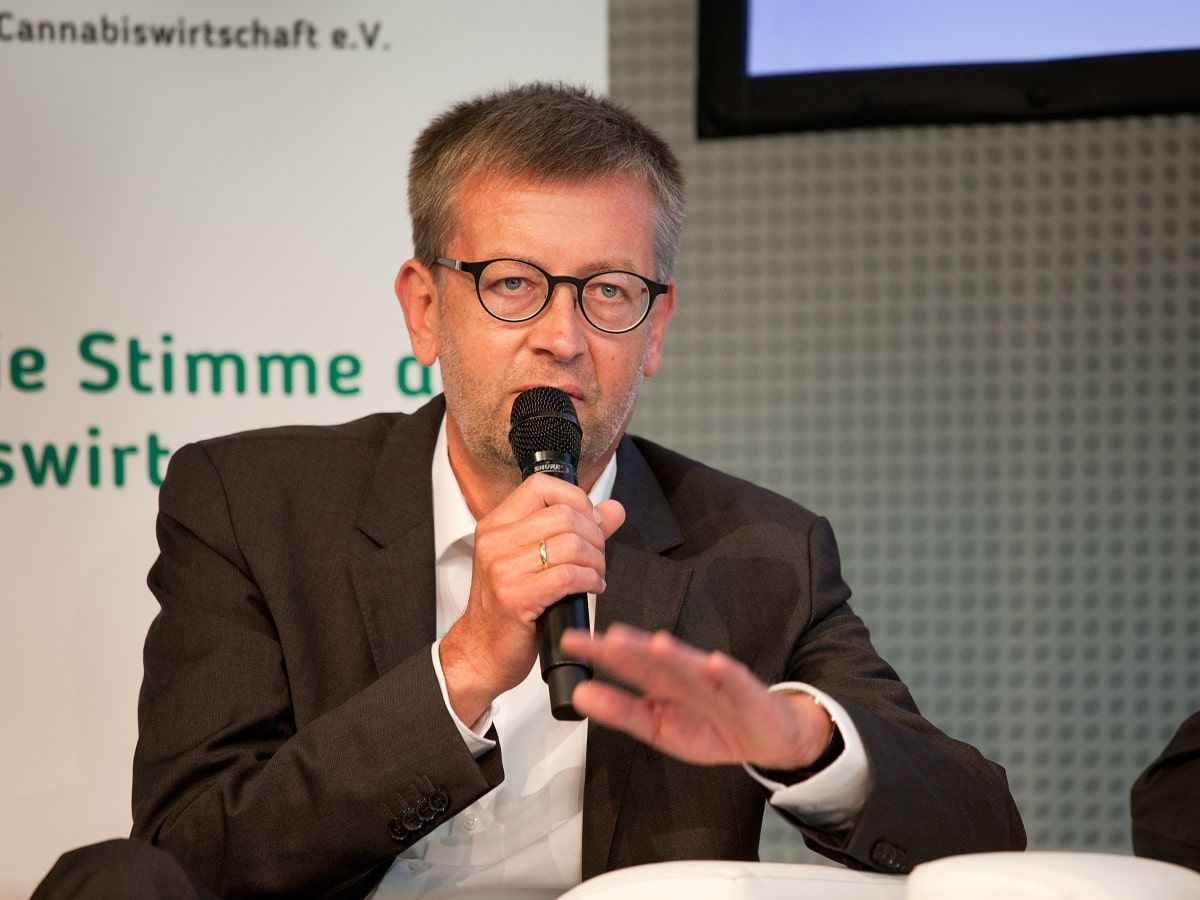Alain Menghé à Menghé is the CEO and Founder of LIO Pharmaceuticals GmbH. LIO Pharmaceuticals GmbH is based in Germany and is one of the top medical cannabis companies in the global cannabis industry. As a successful Market Access Manager, Alain Menghé à Menghé was responsible for the launch of more than ten medical products.
Thanks to his many years of controlling experience at the AOK in the area of product development, he has comprehensive know-how, especially for complex and budget-sensitive projects at an international level. I recently interviewed Alain ahead of his appearance at the International Cannabis Business Conference in Berlin and below is what he had to say (my questions followed by Alain’s answers):
Alex: Where are you originally from and how did you grow up?
Alain: I was born and raised in Cameroon, a coastal country in Midwest Africa. With English and French as official languages, Cameroon is also known as “the miniature Africa”. In fact, all the landscapes that exist in Africa, ranging from the dense jungle in the south of the country to the arid areas in the north are represented in Cameroon. Also all the known African religions are represented in Cameroon, and over 250 different local languages are spoken. So I grew up with principles of diversity and cosmopolitanism. Furthermore, in addition to a competitive sports career, I enjoyed the privilege of an academic education and career which is not always usual there.
All that in conjunction ultimately brought me to Germany.
Alex: What sparked your interest in the cannabis industry?
Alain: Having immigrated to Germany as a professional rugby player after completing my bachelor in biochemistry, I then achieved three master’s degrees first in health economics, consumer health care and last in medical law, all that in parallel with my professional career both in the health insurance landscape and in the pharmaceutical industry.
In my last position as Head of Market-Access in a pharmaceutical company focused on specialty care, I had the responsibility for Germany, Austria and Switzerland as well as for the top 5 European health care systems including near Germany, France, Italy, Spain and UK. I therefore had the direct opportunity to gain in-depth practical insights into the European early-stage market, the international price & reimbursement insights and indeed to come in touch with the global emerging cannabis sector from the very beginning. I then realized the tremendous potential of cannabis as a historic plant for the health care system as cost-effective therapy for several medical indications. This potential is obviously given also for the market around cannabis itself as the basis of a few industries such as nutritional, food or cosmetic. Therefore, cannabis has great potential for the local & global economies. The journey is just starting!
So, according to my academic and professional background, an insight turned into an opportunity, and I had to take advantage of it. I then founded “LIO Pharmaceuticals GmbH” together with strong experienced acquaintances of mine, as a great place to begin to put this expertise and experience in helping build this brand-new sector.
Alex: What industry projects/ventures are you currently working on?
Alain: Our mission, our team and our vision have grown with steady progress in the market. When I founded LIO Pharmaceuticals with my partners, our goal was to combine product innovation in the cannabis sector with pharmaceutical expertise from “big pharma”. We spent time deeply analyzing the local and global cannabis market in order to define the best possible strategic pathway with regard to profitability, competitivity and sustainability. Today, four years later, we have set up a highly qualified team and built up a strong company basis.
We have finalized our new headquarters near Düsseldorf, the unique “Bank of Cannabis,” a more than 1000 sm former bank with an underground bunker as a narcotic and non-narcotic warehouse and enough place for manufacturing processes and office space. From the Bank of Cannabis we plan to supply the complete German market and stepwise the European market. This will be the first European “white label factory” at least both for flowers and for extracts.
Therefore, near the manufacturing of flowers we are in the process of establishing a special extraction capability to jump into the much promising market of extracts as the basis of different cannabis-based derived products. In the meantime, we are finalizing the development of specific cannabis-based brands that results from a long time and accurate market analysis to provide our customer in the medical sector with innovative and valuable products.
We are continuously engaging our former network among the health care professionals (doctors, pharmacists and hospitals) as well as within the health insurance landscape as the most essential stakeholders of our health care system to leverage our market penetration at the highest level ensuring competitivity.
Last but not least, according to LIO Pharmaceuticals’ vision to leverage the unique expertise of our senior management team in the pharmaceutical industry, we plan a row of drug development projects. Indeed we have successfully experienced such activities several times from R&D til product launch up to pricing & reimbursement procedure according to the so-called AMNOG procedure in Germany. This represents one of the unique strengths of LIO Pharmaceuticals and we’ll continue to pursue this mission with this clear focus.
All in one, exciting and globally unique projects, to be presented at ICBC.
Alex: What is your experience as the first and only black CEO of the cannabis industry in Germany?
Alain: To be the first black German chancellor would have been the real breakthrough (laugh). The cannabis market still suffers from deep historical stigmata. It is therefore essential for us as pioneers of the legalization of cannabis not to fail into the “black or white trap”.
Indeed it has often been for me as an African native an ongoing fight for recognition and enforcement free from prejudice and distrust. Thanks to my academic courses as well as my competitive sports career among other things, I have developed enough self-confidence in what I am and what I am able to do and/or achieve. In the meantime, I believe to associate attributes such as diversity and tolerance, which I naturally inherited from my origin, together with the instinct of finding solutions where others may resign and still move forward regardless of any challenges. All that together leads to extremely valuable attributes very useful for LIO Pharmaceuticals and hopefully for the complete sector.
What I have personally experienced nationally as well as internationally is that the cannabis industry is one of the most diverse industries in the world. I have met truly great people in this business and I have experienced and am still experiencing a lot of enthusiasm, openness, dynamism and creativity in my global exchange with market stakeholders. Our team is also very diverse and we claim among others: “Experience meet Start-up spirit”, which I believe is, near our strong expertise, one of our biggest strengths.
Alex: Where do you see the German cannabis industry in five years?
Alain: Obviously, things have changed dramatically just in the last few months / last year, with the new “Ampel coalition” announcing a formal change in the regulatory status of cannabis with regard to a near legalization. That said, there will always be a very important role for those who have established themselves in the pharmaceutical sector. It is clear that those of us who are now fully licensed are in a great position to move forward on the recreational front. Regardless of the details, it is clear that Germany will have a robust cannabis industry in both sectors within this timeframe. Also, for the first time, it won’t just be about Canadians, but a range of products, producers and companies from around the world and particularly from the US will enforce their engagement in Germany as first step market entry in Europe.
However, opening the cannabis market for the recreational sector will also put huge pressure on the supplier. In the medical sector for example, the need of developing indication-specific new drugs will force the actors to increase their engagement in R&D while in the recreational sector there will be a shift in innovative branding development.
It’s an exciting time and a great opportunity for LIO Pharmaceuticals to be a key part of this journey.
Alex: Where do you see the global cannabis industry in five years?
Alain: At some point, there will be a consensus at the international level that cannabis as a plant, as a drug, as a general “consumer good,” and as a tool for environmental remediation, is a commodity that needs to legally come out of the shadows. I am more than confident that this will be worldwide the case in the next decade. The international dynamic will lead to a rash establishment of local and regional policy to open and better regulate this great market, especially both in the EU and in the US together with Cannada. Indeed, Africa will play a fairly big role in the future of cannabis, among others in regard to energy and labour costs. Presumably, the U.S. and China will also make progress at home, which is really one of the last major blocks standing in the way of international cannabis reforms.
All in one, the politically triggered prohibition of cannabis within the last millennium will go down in history.
Alex: What advice do you have for people who want to succeed in the emerging cannabis industry?
Alain: Be flexible, open to surprises and changes, and yes, embrace diversity. It is still a very new industry, and while there are certainly larger players who seem very conventionally positioned, there will always be room for niche start-ups and companies that know how to serve their customers. What we can shape should not be seen as a problem, but rather as an opportunity to act in an open future. Its quality will depend on what we do today. Therefore building the cannabis industry required from existing and new actors dynamism, creativity and know how. It’s a matter of business sustainability and long-term profitability being part of one the greatest revolution of the 3rd millennium.
Rather than following singular interests, we need to come together and build strong advocacy to make sure we are a part of the political discussion that will define the framework of this early-stage cannabis market and industry.







